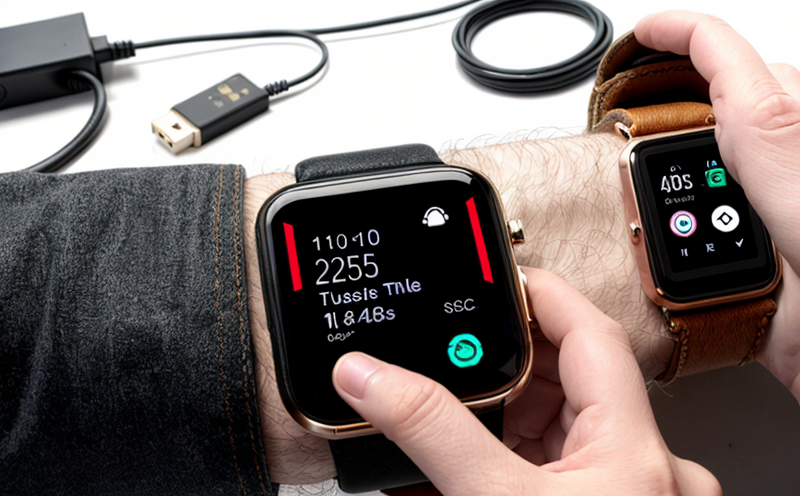IEEE 11073 Interoperability Testing for Wearable Medical Devices
The IEEE P11073-2016 standard provides a framework for interoperability in the healthcare ecosystem, ensuring that wearable medical devices can communicate effectively with other systems and applications. This service focuses on testing these devices to meet the stringent requirements laid out by IEEE 11073, which is particularly important as the market for wearables continues to grow. Compliance with this standard ensures that devices are not only technologically advanced but also interoperable, enhancing patient care and clinical outcomes.
Our service offers comprehensive testing solutions tailored to the unique needs of wearable medical devices. We use state-of-the-art equipment and follow rigorous protocols to ensure that your devices meet or exceed IEEE 11073 requirements. This includes testing for data exchange formats, security protocols, and device registration processes. Our team of experts ensures that each aspect of the standard is thoroughly evaluated, providing you with peace of mind regarding your product's compliance.
The importance of interoperability cannot be overstated in today’s healthcare landscape. With patients often using multiple devices from different manufacturers, seamless communication between these devices can significantly improve treatment outcomes and patient satisfaction. By partnering with us for IEEE 11073 testing, you ensure that your wearable device is ready to integrate into the broader healthcare network.
Our service also includes detailed reports and recommendations for improving any areas where compliance falls short. This proactive approach helps manufacturers address issues early in the development cycle, reducing costs and time-to-market. Additionally, we offer training sessions on IEEE 11073 best practices to help your team understand how to maintain compliance throughout the lifecycle of your product.
For quality managers and compliance officers, this service provides a critical tool for ensuring that wearable medical devices meet all necessary standards. R&D engineers can leverage our expertise to refine their designs, while procurement teams benefit from knowing they are sourcing compliant components. By investing in IEEE 11073 testing early on, companies position themselves at the forefront of innovation and compliance.
Applied Standards
| Standard Name | Description |
|---|---|
| IEEE P11073-2016 | This standard defines the framework for interoperability in healthcare systems, focusing on communication between wearable medical devices and other healthcare technologies. |
| ISO 14155:2011 | An international standard that provides a guideline for the design, development, manufacture, and testing of medical devices intended to be used in clinical investigations. |
| EN 62366-1:2019 | A European standard that specifies requirements for the labeling of medical devices with regard to safety and performance information. |
| IEC 62366:2015 | This international standard provides a framework for the design and development processes of medical devices, including usability engineering. |
| ASTM E2847-19 | An American standard that addresses the requirements for data exchange formats between healthcare systems and wearable devices. |
| IEC 60050-218:2013 | This international standard defines terminology used in electrical engineering, which is essential for understanding IEEE P11073-2016. |
Benefits of IEEE 11073 Interoperability Testing
Compliance with IEEE 11073 ensures that your wearable medical device can seamlessly integrate into existing healthcare systems, enhancing the overall patient experience. This standard promotes interoperability across different platforms and devices, which is crucial in today's fast-evolving healthcare landscape.
By partnering with us for this testing service, you gain several key advantages:
- Enhanced Device Performance: Our rigorous testing ensures that your device meets all specified performance criteria, leading to a more reliable and effective product.
- Facilitated Regulatory Compliance: We help ensure that your device is compliant with relevant international standards, simplifying the regulatory approval process.
- Patient Safety and Satisfaction: Interoperable devices enhance patient care by ensuring that critical data can be accurately transmitted across different systems.
- Competitive Edge: By meeting these rigorous standards, you position your product as a leader in innovation and compliance, giving you a competitive edge in the market.
The benefits extend beyond just the technical aspects of device performance. Interoperability also facilitates better communication between healthcare providers and patients, leading to more efficient care delivery and improved health outcomes. This is particularly important for wearable medical devices that are designed to monitor patient health continuously and provide real-time data to healthcare professionals.
Competitive Advantage and Market Impact
Meeting the requirements of IEEE 11073 not only ensures regulatory compliance but also provides a significant competitive advantage in the market. In an era where patient data is increasingly becoming digitalized, interoperability plays a crucial role in streamlining healthcare processes.
By ensuring that your wearable medical device can seamlessly communicate with other healthcare systems and devices, you enhance its value proposition to both patients and healthcare providers. This interoperability capability sets your product apart from competitors who may not meet these standards, giving you a distinct market advantage.
The global market for wearable medical devices is rapidly expanding, driven by increasing consumer awareness of health and wellness, as well as advancements in technology that enable more accurate and continuous monitoring. Your commitment to IEEE 11073 compliance demonstrates your dedication to quality and innovation, which can translate into increased market share and customer loyalty.
Furthermore, the standard’s focus on security and privacy ensures that patient data is protected throughout its lifecycle, addressing a critical concern for both patients and healthcare providers. This commitment to data security enhances trust in your brand and product, further boosting your competitive position.





